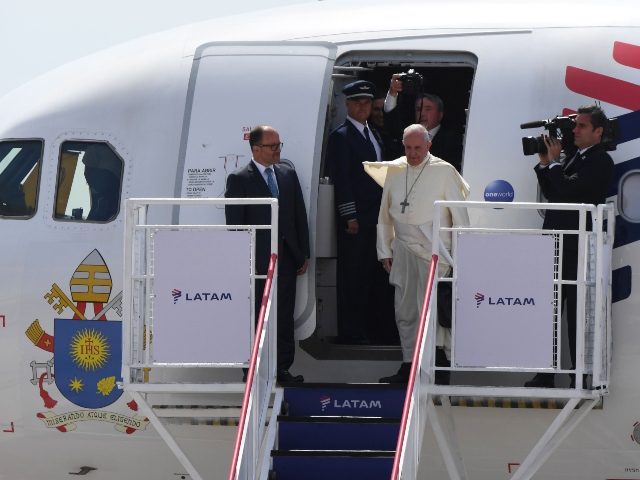ROME — The Vatican has confirmed Pope Francis will fly out to Dubai in early December to attend the U.N.’s COP28 climate summit.
Pope Francis will make the trip to Dubai from 1 to 3 December 2023, “on the occasion of the upcoming Conference of the Parties to the United Nations Framework Convention on Climate Change (COP28),” the Vatican announced, adding that the pope was responding to an invitation “of His Highness Sheikh Mohammed bin Zayed Al Nahyan, President of the United Arab Emirates.”
Pope Francis has made combatting climate change a hallmark of his 10-year pontificate and in October published an apostolic exhortation warning that the world “is collapsing and may be nearing the breaking point” due to global warming.
In that letter, titled Laudate Deum (Praise God), the pontiff called out the United States by name, blaming an “irresponsible lifestyle” for fueling the climate crisis.
“If we consider that emissions per individual in the United States are about two times greater than those of individuals living in China, and about seven times greater than the average of the poorest countries, we can state that a broad change in the irresponsible lifestyle connected with the Western model would have a significant long-term impact,” he asserted.
The pope also called out climate change “deniers,” insisting that it is “no longer possible to doubt the human – ‘anthropic’ – origin of climate change,” because global warming is caused by “the concentration of greenhouse gases in the atmosphere,” which is 423 parts per million as of June 2023.
Woke Pope Francis goes all in! Calls for 'Green economics,' 'Green spirituality,' and 'Green education'! https://t.co/XE18kiUP0f
— Breitbart News (@BreitbartNews) May 25, 2021
“No one can ignore the fact that in recent years we have witnessed extreme weather phenomena, frequent periods of unusual heat, drought and other cries of protest on the part of the earth that are only a few palpable expressions of a silent disease that affects everyone,” he wrote.
“Despite all attempts to deny, conceal, gloss over or relativize the issue, the signs of climate change are here and increasingly evident,” he stated.
Francis has frequently railed against a “politics of fear” and “alarmism” as enemies of the democratic process but has also stoked fears of an impending climate apocalypse in order to incite people to action.
He has called the effects of climate change “catastrophic,” arguing that atmospheric warming is “a global problem with grave implications” and “one of the principal challenges facing humanity in our day.”
Furthermore, last year the pope said that climate change has become an “emergency,” engaging in the very alarmism he has condemned.
This past August, a group of more than 1,600 eminent scientists, including two Nobel Prize winners, issued the “World Climate Declaration,” in which they stated outright: “There is no climate emergency.”
“Climate science has degenerated into a discussion based on beliefs, not on sound self-critical science,” the scholars asserted, enumerating a number of reasons for their criticisms.
The Declaration asserted, for example, that climate models have proven inadequate for predicting global warming, that carbon dioxide (CO2) is not a pollutant, and that climate change has not increased natural disasters.
Pope Francis once again appealed for a concerted international effort to battle climate change Monday, insisting that no one is exempt from this task. https://t.co/sEkJne8tzj
— Breitbart News (@BreitbartNews) January 10, 2022
“The geological archive reveals that Earth’s climate has varied as long as the planet has existed, with natural cold and warm phases,” the text noted. “The Little Ice Age ended as recently as 1850. Therefore, it is no surprise that we now are experiencing a period of warming.”
The world has warmed “significantly less than predicted by IPCC on the basis of modeled anthropogenic forcing,” the document observed, and the gap between the real world and the modeled world “tells us that we are far from understanding climate change.”
“There is no statistical evidence that global warming is intensifying hurricanes, floods, droughts and suchlike natural disasters, or making them more frequent,” the document stated. “However, there is ample evidence that CO2-mitigation measures are as damaging as they are costly.”
“There is no climate emergency,” it concluded. “Therefore, there is no cause for panic and alarm.”

COMMENTS
Please let us know if you're having issues with commenting.